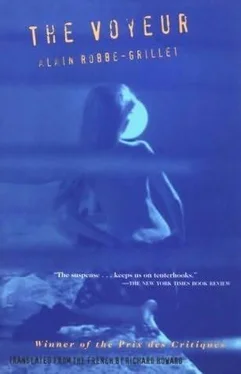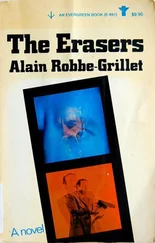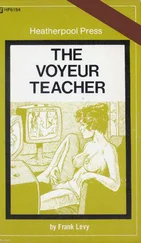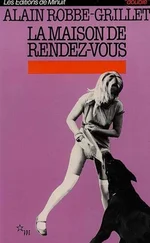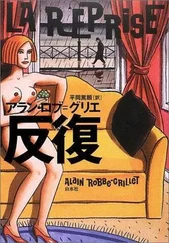Thinking this was a good time to have a smoke, he took out the pack and discovered that several cigarettes were already missing—three, to be exact. He put the pack back in his pocket. The bag of gumdrops had also been opened.
He was walking slowly along the pier, on the side with no railing. The water level was several yards higher. At the end of the pier, against the quay, the sea had entirely covered the strip of mud. Beyond stretched the row of houses and shops: the hardware store at the comer of the square, the butcher shop, the café “A l’Espérance,” the shop that sold everything—women’s lingerie, wrist watches, fish, preserves, etc….
Groping at the bottom of his pocket, Mathias opened the cellophane bag and took out a gumdrop. This one was wrapped in blue paper. Still using only one hand, he unwrapped the paper, put the gumdrop in his mouth, rolled the little rectangle of paper into a ball, and threw it into the water where it floated on the surface.
Leaning over a little farther, he saw at his feet the vertical embankment that plunged into the black water. The strip of shadow cast by the pier would have grown very thin at this time of day. But there was no longer any sunshine; the sky was uniformly overcast.
Mathias advanced to the middle of the cluster of gray parallel lines between the water level and the outer edge of the parapet: the inner rim of the parapet, the angle formed by the jetty and the base of the parapet, the side of the pier that had no railing—rigid horizontal lines, interrupted by several openings, extending straight toward the quay.
The new advertisement represented a landscape.
At least Mathias thought he could make out a moor dotted with clumps of bushes in its interlacing lines, but something else must have been superimposed: here and there certain outlines or patches of color appeared which did not seem to be part of the original design. On the other hand they could not be said to constitute another drawing entirely; they appeared to have no relation to one another, and it was impossible to guess their intention. They succeeded, in any case, in so blurring the configurations of the moor that it was doubtful whether the poster represented a landscape at all.
On the upper section appeared the names of the leading actors—foreign names Mathias thought he had already seen many times, but which he associated with no particular faces. Underneath was spread in huge letters what must have been the name of the film: “Monsieur X on the Double Circuit.” Not conforming to the trends of recent productions, this title—which was scarcely enticing, having little or no relation to anything human—provided remarkably little information about what type of film it described. Perhaps it was a detective story, or a thriller.
Attempting once again to decipher the network of curves and angles, Mathias now recognized nothing at all—it was impossible to decide whether there were two different images superimposed, or just one, or three, or even more.
He stepped back to get a better look at the bulletin-board as a whole, but the more he examined it the more vague, shifting, and incomprehensible it seemed. There were performances on Saturday night and Sunday, not before; he would be unable to see the film, since he intended to leave Friday afternoon.
“Good-looking sign, isn’t it?” said a voice he knew.
Mathias raised his eyes. Above the bulletin-board the garageman’s head had appeared in the doorway.
“That one, yes!…” the salesman began, cautiously.
“Wonder where they get colors like those,” the other continued.
Did this mean that he had discovered what the lines were supposed to represent?
“Here’s your bicycle,” said Mathias. “It’s just played me a nasty trick!”
“I’m not surprised,” the garageman returned, still smiling. “All these new makes are the same—they’re shiny enough, but no good when you need them.”
The salesman recounted his misfortune: he had just missed the boat by a few seconds because of this chain, which at the last minute had made him lose five precious minutes.
The garageman found the incident so commonplace he did not even listen to him. He asked instead: “You came from the pier?”
“Just now…”
“Then you were going to take the bicycle with you?” the man exclaimed as jovially as before.
Mathias explained that he had stopped by the tobacco shop beforehand to leave the bicycle and pay for its use;
but he had found no one there. As he returned to the square—not knowing what to do next—he had heard the boat’s last whistle, the one that meant the gangway was about to be closed, so he had headed toward the pier—not hurrying, since it was too late—just to watch the little steamer pull out—to have something to do, really…
“Yes,” the man said, “I saw you. I was there too, at the end of the pier.”
“Now I’m going to need a room until Friday. Where can I find one?”
The garageman seemed to be thinking it over.
“The boat left at least five minutes late today,” he said, after a rather long silence.
Of course there was no hotel on the island, not even a rooming house. From time to time people rented an empty room, but it was difficult living in someone else’s house, and there were really no conveniences. The best solution, as far as finding out what was available at the moment, was to ask at the café “A l’Espérance,” on the quay. Then the salesman asked how much he owed for the bicycle and paid the twenty crowns he was charged. In consideration of the bicycle’s newness, on the one hand, and its irregular operation on the other, it was difficult to say whether this was cheap or expensive.
“Wait a minute,” the tobacconist continued, “there’s the Widow Leduc just nearby—she used to have a good room to rent out; but she’s off her head today, ever since her kid disappeared. You’d better leave her alone.”
“Disappeared?” the salesman asked. “Madame Leduc is an old friend; I saw her only this morning. I hope nothing has happened…”
“It’s that little Jacqueline again: they’ve been looking for her since noon, but no one can find her.”
“She can’t be far, after all! The island isn’t so big as that!”
The meadows and the moor, the potato fields, the edge of the fields, the hollows in the cliff, the sand, the rocks, the sea…
“Don’t fool yourself,” said the man, winking at him. “Someone knows where she is.”
Mathias did not dare leave. He had waited too long again. And now he was obliged to struggle a second time with silences that threatened to riddle the conversation at every turn: “Then that was it,” he said, “that business with the sheep they were talking about at Black Rocks?”
“Yes, that’s it—she was tending the sheep, but the wolf got the shepherdess!” etc…. etc….
And also: “At thirteen! It’s really a shame”—“She’s got a devil inside her”—“A wild animal!”—“Children are a lot of trouble”—“She deserves to be….”
There was no reason for it to stop. Mathias said something, the man answered, Mathias answered that. The man said something, Mathias answered. Mathias said something, Mathias answered. Little Jacqueline was walking along the path on top of the cliff, showing off her delicate, scandalous silhouette. In the hollows, sheltered from the wind, in the long meadow grass, under the hedges, against the trunk of a pine, she stopped and slowly ran her fingertips over her hair, her neck, her shoulders…
She always came home to sleep—the last house as you left town on the road to the big lighthouse. Tonight, when Mathias would climb upstairs to his room, having said goodnight to the mother and the two older sisters, holding his lighted candle in front of him in his right hand and in his left his little suitcase in which he had carefully stored the cord, raising his head—he would see, a few steps higher, showing him the way up the dark staircase, so slender in her little black peasant girl’s dress, Violet as a child…. Violet! Violet! Violet!
Читать дальше
